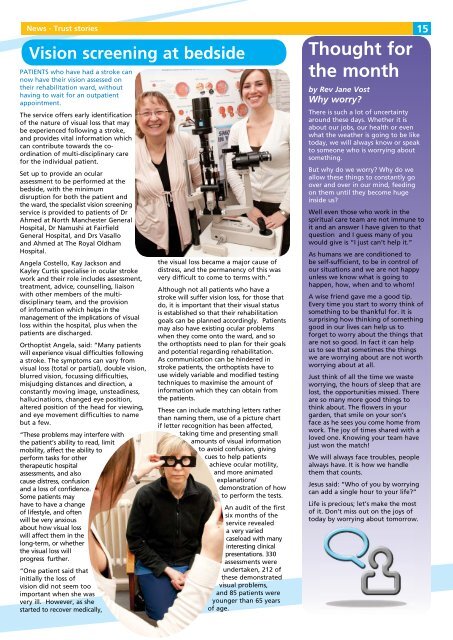May 2012 - Pennine Acute Hospitals NHS Trust
May 2012 - Pennine Acute Hospitals NHS Trust
May 2012 - Pennine Acute Hospitals NHS Trust
You also want an ePaper? Increase the reach of your titles
YUMPU automatically turns print PDFs into web optimized ePapers that Google loves.
News - <strong>Trust</strong> stories<br />
Vision screening at bedside<br />
PATIENTS who have had a stroke can<br />
now have their vision assessed on<br />
their rehabilitation ward, without<br />
having to wait for an outpatient<br />
appointment .<br />
The service offers early identification<br />
of the nature of visual loss that may<br />
be experienced following a stroke,<br />
and provides vital information which<br />
can contribute towards the coordination<br />
of multi-disciplinary care<br />
for the individual patient .<br />
Set up to provide an ocular<br />
assessment to be performed at the<br />
bedside, with the minimum<br />
disruption for both the patient and<br />
the ward, the specialist vision screening<br />
service is provided to patients of Dr<br />
Ahmed at North Manchester General<br />
Hospital, Dr Namushi at Fairfield<br />
General Hospital, and Drs Vasallo<br />
and Ahmed at The Royal Oldham<br />
Hospital .<br />
Angela Costello, Kay Jackson and<br />
Kayley Curtis specialise in ocular stroke<br />
work and their role includes assessment,<br />
treatment, advice, counselling, liaison<br />
with other members of the multidisciplinary<br />
team, and the provision<br />
of information which helps in the<br />
management of the implications of visual<br />
loss within the hospital, plus when the<br />
patients are discharged .<br />
Orthoptist Angela, said: “Many patients<br />
will experience visual difficulties following<br />
a stroke . The symptoms can vary from<br />
visual loss (total or partial), double vision,<br />
blurred vision, focussing difficulties,<br />
misjudging distances and direction, a<br />
constantly moving image, unsteadiness,<br />
hallucinations, changed eye position,<br />
altered position of the head for viewing,<br />
and eye movement difficulties to name<br />
but a few .<br />
“These problems may interfere with<br />
the patient’s ability to read, limit<br />
mobility, affect the ability to<br />
perform tasks for other<br />
therapeutic hospital<br />
assessments, and also<br />
cause distress, confusion<br />
and a loss of confidence .<br />
Some patients may<br />
have to have a change<br />
of lifestyle, and often<br />
will be very anxious<br />
about how visual loss<br />
will affect them in the<br />
long-term, or whether<br />
the visual loss will<br />
progress further .<br />
“One patient said that<br />
initially the loss of<br />
vision did not seem too<br />
important when she was<br />
very ill . However, as she<br />
started to recover medically,<br />
the visual loss became a major cause of<br />
distress, and the permanency of this was<br />
very difficult to come to terms with .”<br />
Although not all patients who have a<br />
stroke will suffer vision loss, for those that<br />
do, it is important that their visual status<br />
is established so that their rehabilitation<br />
goals can be planned accordingly . Patients<br />
may also have existing ocular problems<br />
when they come onto the ward, and so<br />
the orthoptists need to plan for their goals<br />
and potential regarding rehabilitation .<br />
As communication can be hindered in<br />
stroke patients, the orthoptists have to<br />
use widely variable and modified testing<br />
techniques to maximise the amount of<br />
information which they can obtain from<br />
the patients .<br />
These can include matching letters rather<br />
than naming them, use of a picture chart<br />
if letter recognition has been affected,<br />
taking time and presenting small<br />
amounts of visual information<br />
to avoid confusion, giving<br />
cues to help patients<br />
achieve ocular motility,<br />
and more animated<br />
explanations/<br />
demonstration of how<br />
to perform the tests .<br />
An audit of the first<br />
six months of the<br />
service revealed<br />
a very varied<br />
caseload with many<br />
interesting clinical<br />
presentations . 330<br />
assessments were<br />
undertaken, 212 of<br />
these demonstrated<br />
visual problems,<br />
and 85 patients were<br />
younger than 65 years<br />
of age .<br />
Thought for<br />
the month<br />
by Rev Jane Vost<br />
Why worry?<br />
15<br />
There is such a lot of uncertainty<br />
around these days . Whether it is<br />
about our jobs, our health or even<br />
what the weather is going to be like<br />
today, we will always know or speak<br />
to someone who is worrying about<br />
something .<br />
But why do we worry? Why do we<br />
allow these things to constantly go<br />
over and over in our mind, feeding<br />
on them until they become huge<br />
inside us?<br />
Well even those who work in the<br />
spiritual care team are not immune to<br />
it and an answer I have given to that<br />
question and I guess many of you<br />
would give is “I just can’t help it .”<br />
As humans we are conditioned to<br />
be self-sufficient, to be in control of<br />
our situations and we are not happy<br />
unless we know what is going to<br />
happen, how, when and to whom!<br />
A wise friend gave me a good tip .<br />
Every time you start to worry think of<br />
something to be thankful for . It is<br />
surprising how thinking of something<br />
good in our lives can help us to<br />
forget to worry about the things that<br />
are not so good . In fact it can help<br />
us to see that sometimes the things<br />
we are worrying about are not worth<br />
worrying about at all .<br />
Just think of all the time we waste<br />
worrying, the hours of sleep that are<br />
lost, the opportunities missed . There<br />
are so many more good things to<br />
think about . The flowers in your<br />
garden, that smile on your son’s<br />
face as he sees you come home from<br />
work . The joy of times shared with a<br />
loved one . Knowing your team have<br />
just won the match!<br />
We will always face troubles, people<br />
always have . It is how we handle<br />
them that counts .<br />
Jesus said: “Who of you by worrying<br />
can add a single hour to your life?”<br />
life is precious; let’s make the most<br />
of it . Don’t miss out on the joys of<br />
today by worrying about tomorrow .







